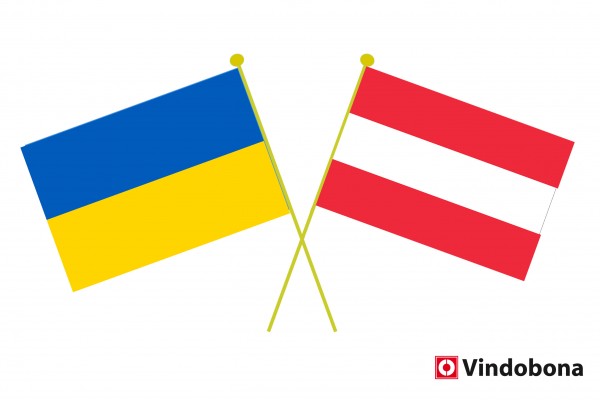Austria's Position on the Russia-Ukraine Conflict
Despite ongoing diplomatic efforts, tensions between Russia and Ukraine remain high as Russia still has thousands of troops stationed on the Ukrainian border. Read Austria's position on the issue.
 Austria warns of "massive political and economic consequences for Russia" if it invades Ukraine. / Picture: © Ukrainian and Austrian crossed flags by Vindobona.org
Austria warns of "massive political and economic consequences for Russia" if it invades Ukraine. / Picture: © Ukrainian and Austrian crossed flags by Vindobona.org
The Russia-Ukraine conflict was a major topic of discussion at a recent session of the Austrian National Council.
Given the large number of troops Russia has amassed on the Ukrainian border, the Austrian government acknowledges that the situation is “very serious.”
Austria has shown a committment to and insists upon finding a diplomatic solution to the problem.
Therefore, Austria is encouraged by the recent talks at NATO, the Organization for Security and Cooperation in Europe (OSCE), and bilaterally.
Austria believes that it is important for dialogue to continue but also argued that negotiations cannot be done with “tanks and missiles,” referring to Russia’s military buildup on the border, joint maneuvers with Belarus, cyberattacks on Ukraine, and threats of stationing troops in Cuba or Venezuela.
As it is a neutral country and the seat of the OSCE, Austria feels that it can play a key role in facilitating a diplomatic solution.
While diplomacy is Austria’s goal, the government has also admitted that some of Russia’s demands, such as a formal declaration that Ukraine will not be allowed to join NATO, are “unfulfillable.”
However, Austria believes that other issues–such as more arms control for conventional weapons, restrictions on the stationing of short- and medium-range missiles, greater transparency in military maneuvers, and hotlines between the militaries–could serve as negotiating points.
Additionally, Austria has argued that the European Union should also be pressing for a diplomatic solution and taking a more active role in negotiations because it does not have a military that Putin could feel threatened by.
Austria sees this as a historic opportunity for the EU to solve the crisis through mediation.
Although there was widespread agreement among the Austrian political parties that the goal should be a diplomatic solution, the opposition parties disagreed on some issues, such as whether Austria should remain neutral and if Austria is becoming too close to NATO and ignoring Russia’s concerns.
Nord Stream II on the table
The Austrian government said that Ukraine’s sovereignty is non-negotiable and warned that “further aggression would have massive economic and political consequences for Russia.”
One such consequence being considered is a shutdown of the Nord Stream II natural gas pipeline from Russia to Germany.
Austria has asserted that a shutdown of this pipeline should be not used as a preventive measure.
However, the Austrian government argued that the pipeline should be shut down if Russia invades Ukraine.



